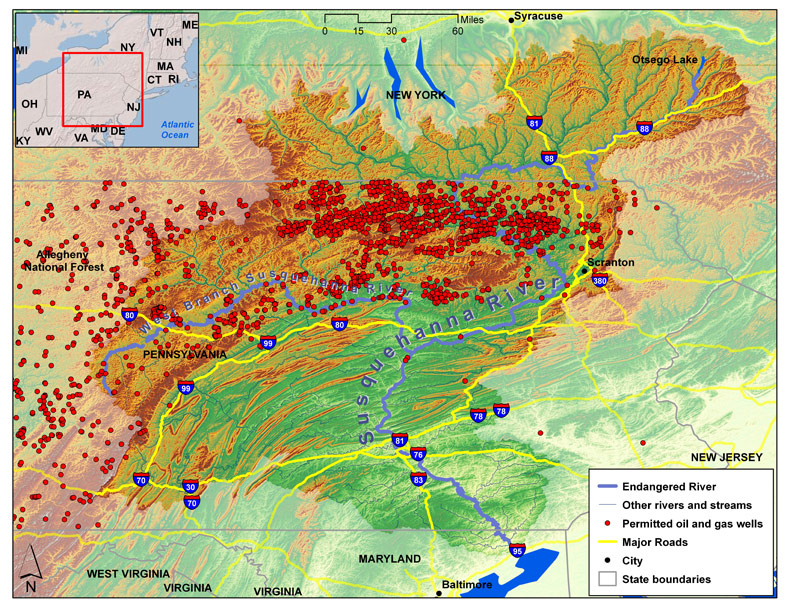 Susquehanna River (click to enlarge)/Image via American RiversIn Pennsylvania, development of natural gas resources is proving to come at a high price. Thanks to natural gas drilling (or fracking) the Susquehana River has been named the most endangered river in the U.S. by American Rivers for the second year in a row.
Susquehanna River (click to enlarge)/Image via American RiversIn Pennsylvania, development of natural gas resources is proving to come at a high price. Thanks to natural gas drilling (or fracking) the Susquehana River has been named the most endangered river in the U.S. by American Rivers for the second year in a row.
Each year, American Rivers releases a report with the top 10 most endangered rivers in the country. In 2010 the Upper Delaware River Basin took home the tainted crown. This year, the Susquehanna is the winner of the backwards beauty pageant.
Flowing through Pennsylvania, New York and Maryland, the Susquehanna is one of the longest rivers in the country, providing drinking water for millions and freshwater to the Chesapeake Bay.
Unfortunately, the Susquehanna also stretches over the Marcellus Shale, a geologic formation that extends from Ohio and West Virginia northeast into Pennsylvania and southern New York. The Marcellus Shale is estimated to hold 100 to 500 times the amount of natural gas used in New York State annually.
With so much natural gas, the Marcellus Shale has become a hotbed for fracking. But regulations for natural gas extraction are weak or lacking. Huge amounts of water are being withdrawn from the Susquehanna and wastewater and toxic chemicals are leaking into the water system.
The Upper Delaware River Basin, providing drinking water for approximately 17 million in Pennsylvania (including Philadelphia) and New York, topped the 2010 list for these same reasons. As did the Monongahela River (Pennsylvania and West Virginia), which came in at ninth last year.
This is not the first “most endangered” title for the Susquehanna. In 2005, sewage pollution and dam construction threatened the river’s health. However, days after the report was released, the EPA dropped a proposal that would have allowed for the dumping of partially treated sewage into the river and the Army Corps of Engineers denied the permit to construct the dam.
Ideally, American Rivers wants similar success stories for all the water ways named to their list. For the Susquehanna this means achieving a moratorium on water and natural gas withdrawals until sufficient regulations are in place.
This moratorium is not a new goal. Organizations like Protecting Our Waters, Damascus Citizens for Sustainability, and Riverkeeper’s Delaware River and Lower Susquehanna branches have spent years fighting fracking to protect Pennsylvania’s waterways. To learn more about fracking see our posts from earlier this month (May 19 and May 16) and read Jacob Lambert’s GRID March cover story (p. 16-19).







